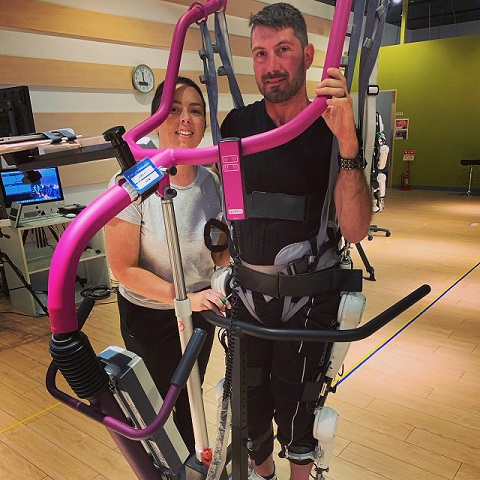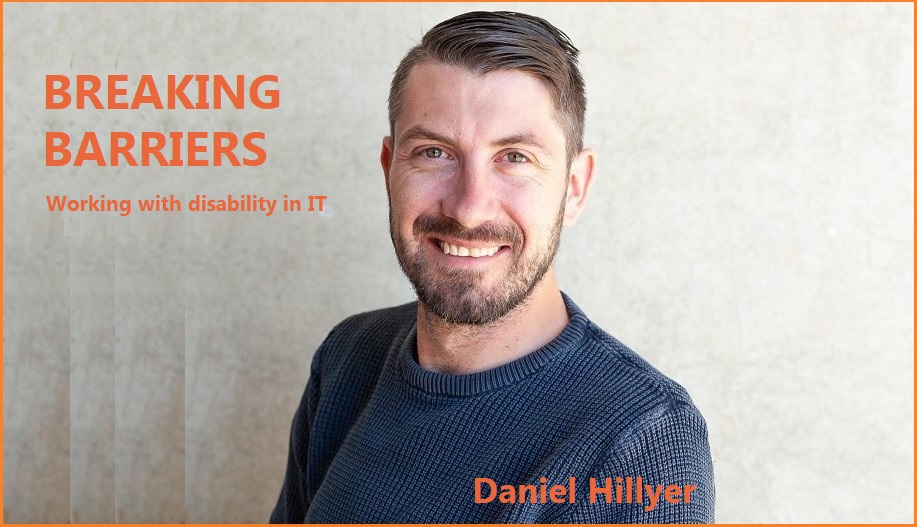Before sustaining a spinal cord injury in a serious accident, Daniel Hillyer spent most days working on his feet as a chef.
Now, a decade later, he has reskilled in tech and helped to build two companies assisting people with similar conditions in finding care and independence.
Hillyer co-founded tappON with his wife, Maryanne Harris, in 2017.
The company provides an all-in-one platform for managing personal care, domestic and cleaning supports, gardening and house maintenance for people with a disability.
He also co-founded Robofit, also with his wife, a company utilising innovative technology such as neuro-controlled exoskeletons to help people with spinal cord injuries or those who have suffered a stroke, with rehabilitation.
The 32-year-old lives in Coledale in New South Wales, a 90-minute drive from Sydney.
Both companies are very close to Hillyer’s heart, with inspiration coming from the difficulties he faced following the accident in May 2010, where he sustained a C4/C5 incomplete spinal cord injury.
This left him in a wheelchair and requiring the help of carers for day-to-day activities.
Through his experiences with rehabilitation, carers and using new technologies to assist with walking, Hillyer saw a gap in the market and began working on tappON.
“I first focused on my rehabilitation for seven years before tappON was born,” Hillyer said. “I travelled to Japan to use the exoskeletons during this time, which helped me regain the ability to walk.
“Seeing the impact that technology can have on improving lives, I thought it was a great opportunity to get involved in tappON to make a difference with how a person with a disability or additional care needs receives care and support.”

The tappON platform connects people with a disability with support professionals in their local area, who have also set up a profile on the site. tappON then connects users based on location, helping to ensure a familiar face and stable healthcare for those who need it.
tappON is available for anyone on an NDIS plan, aged or home care clients and self-funded users.
Hillyer is the customer experience manager at tappON, using his personal experiences to give other people with a disability more independence and freedom.
“My role here is to assist our support professionals with our onboarding process, verifying their application forms and vetting all documents before approving and setting up a profile on their behalf, which is then active within our tappON discovery board for our members to connect with and book to receive in-home care support,” he said.
“It’s about giving the individual back the control over who, when and where they receive this support.
"Given the large gap in the market, we set out to create a business that helps empower individuals and get their independence back. As part of our mission it is important for us to embrace diversity and inclusion in our workforce as we grow as well.”
tappON joined the iAccelerate Program, based in North Wollongong’s innovation campus, where Hillyer and his team took part in mentoring sessions weekly, helping them to set up and run the business.
“I also had a lot of individuals, family and friends who have helped mentor me along the way,” Hillyer said. “My wife has been my major mentor to me along this journey and she taught me a lot around business. IT wasn't my strongest suit but I feel really comfortable about where we’re at today.”
Hillyer worked as a chef before the accident, and had to reskill himself entirely in IT.
“Being a chef, I was on my feet all day moving at a fast pace,” he said. “When I first began working at tappON, I had to completely reskill and embrace the uncertainty of moving into a completely different work environment.”
Robofit is also helping those with a spinal cord injury participate in rehabilitation.
“Using these wearable robots and tapping into the power of neuroplasticity, positive feedback loops back to the brain help to rewire and establish new neural pathways that then lead to improvements in ability,” Hillyer said.
Because he founded two companies with his wife, Hillyer has not experienced job interviews since the accident, but is actively working to change some preconceived notions about people with a disability.
“I don’t hold any anger towards any assumptions about my ability to do my job,” he said. “I believe I am here to help make a change and assist people in a similar situation as myself.”










